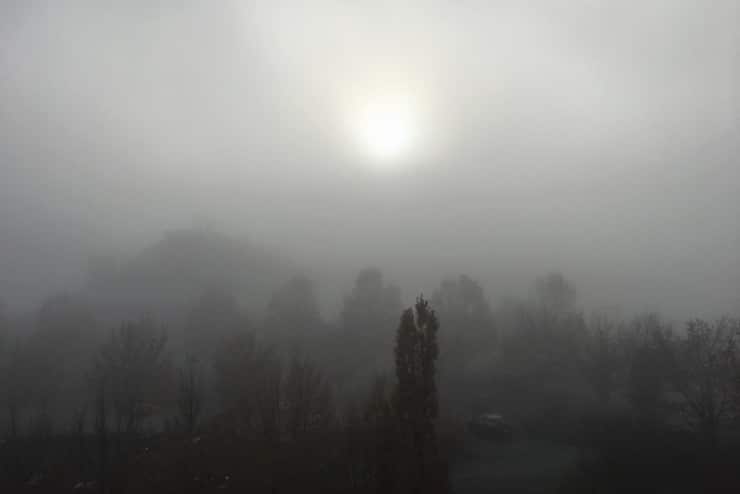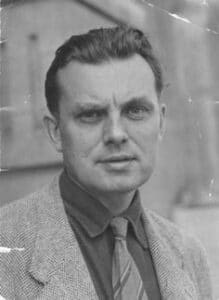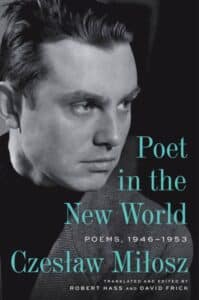
Czeslaw Milosz’s poetry reflects the dissonance of turmoil and exile
Poet Czeslaw Milosz (1911-2004) lived through some of the most tumultuous events of the 20th century. His Polish parents fled Poland during a political upheaval; he was born in Lithuania when it was ruled by tsarist Russia. Then came the Great War, the Russian Revolution, and the Russian Civil War. His family returned to Poland, and life seemed to settle down.
He was 21 when he published his first poetry collection, Poem of the Frozen Time, in 1932. The next year, Hitler became dictator of Germany. When Germany invaded Poland in 1939, Milosz became part of the underground resistance. After the war, he joined the new communist government’s diplomatic corps and was stationed in Paris and then Washington, D.C. In 1951, he defected to the West.
His post-war poems reflect the impact of the dislocations he experienced. In little more than a year, he went from resistance fighter in Poland to diplomat in Paris. America was even more of a shock; he must have felt he had stepped onto another planet to move from the destruction of Poland to the bustling U.S. capital and the skyscrapers of New York City. And making its heavy presence known was the tightening fist of Soviet Russia.
Poet in the New World: Poems, 1946-1953 collects Milosz’s poems from the postwar and early defection or self-exile period. Translated by Robert Hass and David Frick, the collection makes clear that Milosz struggled with the cumulative upheavals in his life.
The first poem is the one that haunts all of what follows. “In Warsaw” depicts Milosz standing amid the ruins of Poland’s capital city, some 80 percent destroyed, a symbol of the destruction wrought upon all of Poland and Europe by the Nazi invasion and occupation. It is a lament for more than the physical destruction he sees.
from “In Warsaw”
What are you doing here, poet, on the ruins
Of St. John’s Cathedral this sunny
Day in spring?
What are you thinking here, where the wind
Blowing from the Vistula scatters
The red dust of the rubble?
You swore never to be
A ritual mourner.
You swore never to touch
The deep wounds of your nation
So you would not make them holy
With the accursed holiness that pursues
Descendants for many centuries.
But the lament of Antigone
Searching for her brother
Is indeed beyond the power
Of endurance. And the heart
Is a stone in which is enclosed,
Like an insect, the dark love
Of a most unhappy land.
I did not want to love so.
That was not my design.
I did not want to pity so.
That was not my design …
The decision not to look backward but only forward is upended by the scenes od destruction, the “red dust of the rubble.” He thought himself prepared to see it, but the reality proved him wrong. He goes on to ask himself, “How can I live in this country / Where the foot knocks against / The unbred bones of kin?” He will distance himself from what he knows is lost by first joining Poland’s diplomatic corps, followed by defection five years later.

Czeslaw Milosz about 1950
That sense of loss follows Milosz during the next several years, as he moves first to Paris for a short period and then to Washington, D.C. Paris physically survived the war and occupation, while cities like Washington and New York were changed but left largely untouched. He writes about fellow exiles, like Albert Einstein; people left behind; the play Antigone by Sophocles; Hiroshima; the “Faust of Warsaw”; and more. But the scenes of that first Warsaw poem haunt and inform the rest.
After defecting to France in 1951, Milosz eventually joined the faculty at the University of California (US) at Berkeley in 1960. A member of the American Academy and Institute of Arts and Letters, he received the Nobel Prize for Literature in 1980.
Robert Hass is emeritus professor of English at UC–Berkeley and has published numerous poetry collections and translations. A recipient of both the National Book Award and the Pulitzer Prize for poetry, he’s also served as president of the Academy of American Poets. David Frick (1955–2022) was distinguished professor emeritus of Slavic Languages and Literatures, also at Berkeley. He was considered the world authority on the cultural history of Eastern Europe in the early modern period.
Poet in the New World tells a story of destruction, loss, and exile. Surveying both the exterior and interior wreckage, it asks what the role of the poet is in that kind of world. It was a question that Milosz would continue to ask for the next 50 years, and the answer is simply the poems he wrote.
Related:
Czesław Milosz’s speech at the Nobel Prize luncheon in 1980
Photo by Martin Fisch, Creative Commons, via Flickr. Post by Glynn Young.
How to Read a Poem uses images like the mouse, the hive, the switch (from the Billy Collins poem)—to guide readers into new ways of understanding poems. Anthology included.
“I require all our incoming poetry students—in the MFA I direct—to buy and read this book.”
—Jeanetta Calhoun Mish
- “Your Accent! You Can’t Be from New Orleans!” - October 9, 2025
- Poets and Poems: Donna Vorreyer and “Unrivered” - October 7, 2025
- Poet Sidney Lanier and the Lost Cause - October 2, 2025


Leave a Reply